I'm reminded yearly by the darkness and the cold that I live in the wrong place. I don't mean that my specific location is inherently bad or unlivable; I mean that my very being seems out of sync with the climate.
It makes sense that I should feel that way (that we can diagnose such a feeling with the acronym S.A.D. brings linguistic symmetry, if not psychological relief) because humanity doesn't have origins in such a place.
Humanity has its roots in the heat of Africa, civilization around the warm shores of the Mediterranean. The cold and dark north, for much of human history, has been home to only the barbarous, a place to be feared by those familiar with the finer trappings of a life on this planet (there are some in the home counties who would still subscribe to such a view).
I therefore grant myself an annual reprieve for my winter inertia via the logic that my brain doesn't seem to fully function in a North England December for the simple reason that it wasn't designed to. I don't, we don't, belong in this wintery climate. It's a climate that broods, punishes, tests resolve, but it does afford us one gift. One thing that it wouldn't do to hibernate away from. Snow.
Beautiful, still, soft, pure, silent snow.
What follows is an anthology of writing about the white fluffy stuff; may it serve as your seasonal postcard. Happy holidays!
The Magpie, Claude Monet, 1868
I've already made a connection between the cold and we barbarous folk of the North, so let's build on that by starting with Mary Shelley's 'creature' in Frankenstein; or, The Modern Prometheus (1818), whose internal desolation and hostility find a mirror in the wintery landscape:
‘My travels were long and the sufferings I endured intense. It was late in autumn when I quitted the district where I had so long resided. I travelled only at night, fearful of encountering the visage of a human being. Nature decayed around me, and the sun became heatless; rain and snow poured around me; mighty rivers were frozen; the surface of the earth was hard and chill, and bare, and I found no shelter. Oh, earth! How often did I imprecate curses on the cause of my being! The mildness of my nature had fled, and all within me was turned to gall and bitterness. The nearer I approached to your habitation, the more deeply did I feel the spirit of revenge enkindled in my heart. Snow fell, and the waters were hardened, but I rested not.’
That there's hostility in the snow is beyond doubt, but it's a hostility that often meets its match in human resilience and childlike thirst for joy. Here's just one of many Dickens extracts I could have chosen to illustrate the point:
‘and they stood in the city streets on Christmas morning where (for the weather was severe) the people made a rough, but brisk and not unpleasant kind of music, in scraping the snow from the pavement in front of their dwellings, and from the tops of their houses, whence it was mad delight to the boys to see it come plumping down into the road below, and splitting into artificial little snow-storms’
Charles Dickens, A Christmas Carol, 1843
Illustration from The Snowy Day by Ezra Jack Keats, 1962
I think a lot of our appreciation of snow derives from the pleasure we gain from eluding its more hostile qualities. We value it, almost paradoxically, because it allows us to feel the relief of warmth more deeply. It's why so much of the seasonal imagery of snow is accompanied by a glowing window in the background.
‘But where are compensations to be found? Even in St. Petersburg, despite its grim and murky exterior, they exist. Yes, even though thirty degrees of keen, cracking frost may have bound the streets, and the family of the North Wind be wailing there, and the Snowstorm Witch have heaped high the pavements, and be blinding the eyes, and powdering beards and fur collars and the shaggy manes of horses—even THEN there will be shining hospitably through the swirling snowflakes a fourth-floor window where, in a cosy room, and by the light of modest candles, and to the hiss of the samovar, there will be in progress a discussion which warms the heart and soul, or else a reading aloud of a brilliant page of one of those inspired Russian poets with whom God has dowered us, while the breast of each member of the company is heaving with a rapture unknown under a noontide sky.’
Nikolai Gogol, Dead Souls, 1842
Nocturne in Grey and Gold: Chelsea Snow, James Abbott McNeill Whistler, 1878
Someone not content to admire the snow from the warm confines of a glowing living room, however, was Nan Shepherd, who devoted a chapter of The Living Mountain (1977) to ice and snow on her beloved Cairngorms. Particularly striking is the subtle range of colours available to those who really know how to look. Before I read Shepherd I had laboured under the delusion that snow was white. How foolish...
‘The intense frost, the cloudless sky, the white world, the setting sun and the rising moon, as we gazed on them from the slope of Morrone, melted into a prismatic radiation of blue, helio, mauve, and rose. The full moon floated up into green light, and as the rose and violet hues spread over snow and sky, the colour seemed to live its own life, to have body and resilience, as though we were not looking at it, but were inside its substance.
Next day a brilliant sun spangled the snow and the precipices of Ben a' Bhuird hung bright rose-red above us. How crisp, how bright a world! but, except for the crunch of our own boots on the snow, how silent.’
The silence she touches upon is neither imagination nor poetic license. Studies conducted by the University of Kentucky have found that snow can absorb up to 60% of sound, therefore ascribing the calming sensation that accompanies a walk in the snow to its acoustic properties.
Ivy Cottage, Cold Harbour, Sun and Snow, Lucien Pissarro, 1916
But the stillness and silence of snow can be as unsettling as it is serene. For many writers, like Percy Bysshe Shelley in The Cold Earth Slept Below (1815), snow evokes the quiet of death, life's clamor becoming stilled by the muting white blanket shrouding the earth.
‘The cold earth slept below;
Above the cold sky shone;
And all around,
With a chilling sound,
From caves of ice and fields of snow
The breath of night like death did flow
Beneath the sinking moon.’
We also get snow as a signifier of death in the fairytale of Snow White (1812) by the Brothers Grimm. The opening passage is rich in colour connotation, with the vibrant red of Snow White’s cheeks suggesting life contrasted with the white coldness of death.
‘It was in the middle of winter, when the broad flakes of snow were falling around, that a certain queen sat working at her window, the frame of which was made of fine black ebony; and, as she was looking out upon the snow, she pricked her finger, and three drops of blood fell upon it. Then she gazed thoughtfully down on the red drops which sprinkled the white snow and said, "Would that my little daughter may be as white as that snow, as red as the blood, and as black as the ebony window-frame!" And so the little girl grew up; her skin was a white as snow, her cheeks as rosy as blood, and her hair as black as ebony; and she was called Snow-White.’
Snow and death in The Coen Brothers’ Fargo (1996)
And, of course, snow is again connected with death, famously, brilliantly, in James Joyce's The Dead from Dubliners (1914).
‘A few light taps upon the pane made him turn to the window. It had begun to snow again. He watched sleepily the flakes, silver and dark, falling obliquely against the lamplight. The time had come for him to set out on his journey westward. Yes, the newspapers were right: snow was general all over Ireland. It was falling on every part of the dark central plain, on the treeless hills, falling softly upon the Bog of Allen and, farther westward, softly falling into the dark mutinous Shannon waves. It was falling, too, upon every part of the lonely churchyard on the hill where Michael Furey lay buried. It lay thickly drifted on the crooked crosses and headstones, on the spears of the little gate, on the barren thorns. His soul swooned slowly as he heard the snow falling faintly through the universe and faintly falling, like the descent of their last end, upon all the living and the dead.’
If that was a predictable inclusion then I'm happy to be predictable.
Snow's transformative quality, its ability to erase, is also explored by Emily Dickinson in It Sifts from Leaden Sieves (1862). Dickinson personifies snow as an artisan, working meticulously to alter the landscape, however impermanent the alterations may be.
‘It reaches to the fence, / It wraps it, rail by rail, / Till it is lost in fleeces; / It flings a crystal veil / On stump and stack and stem,—/ The summer’s empty room, / Acres of seams where harvests were, / Recordless, but for them. / It ruffles wrists of posts, / As ankles of a queen,— / Then stills its artisans like ghosts, / Denying they have been.’
Evening Snow at Kanbara, Utagawa Hiroshige
And in the underappreciated Sleepless Nights by Elizabeth Hardwick:
‘Winter came down upon them. The suicide season arrived early. The land, after a snowfall, would turn into a lunar stillness, satanic, brilliant. The tall trees, altered by the snow and ice, loomed up in the arctic landscape like ancient cataclysmic formations of malicious splendor. The little houses on the road...trembling there in the whiteness, might be settlements waiting for a doom that would come over them silently in the night.’
Whilst in Tarjei Vesaas' The Ice Palace (1963), the object erased by the snow is the mysterious and beguiling Unn, the new girl at school. Here, the snow isn't picturesque but disorienting, blinding, engulfing. To summarise this as a story of the 'fragility of human beings against the immensity of nature' would be to strip it of its magic; something far more haunting is happening.
‘Then came the evening, and with it the urgent question: Where is Unn?
Snow, came the reply from hearth and home. It was real winter. And Unn had vanished into it. In spite of all their searching, not a trace was to be found. It was as blind around Unn as in the blinding snowstorms.’
New Snow in the Avenue, Edvard Munch, 1906,
Different but no less beautiful is the snow in Bruno Schultz' short story Birds from his collection The Street of Crocodiles (1934), where it fails to fulfill its transformative potential. There's no postcards here, no blanketing of the town's imperfections.
‘Came the yellow days of winter, filled with boredom. The rust-coloured earth was covered with a threadbare, meagre tablecloth of snow full of holes. There was not enough of it for some of the roofs and so they stood there, black and brown, shingle and thatch, containing the sooty expanses of attics - coal-black cathedrals, bristling with ribs of rafters, beams, and spars- the dark lungs of winter winds. Each dawn revealed new chimney stacks and chimney pots which had emerged during the hours of darkness, blown up by the night winds: the black pipes of a devil's organ. The chimney sweeps could not get rid of the crows which in the evening covered the branches of the trees around the church with living black leaves, then took off, fluttering, and came back, each clinging to its own place on its own branch, only to fly away at dawn in large flocks, like gusts of soot, flakes of dirt, undulating and fantastic, blackening with their insistent crowing the musty yellow streaks of light. The days hardened with cold and boredom like last year's loaves of bread. One began to cut them with blunt knives without appetite, with a lazy indifference.’
Illustration from Snow by Uri Shulevitz, 1999
But we don't want to end with ‘lazy indifference’. It's Christmas, after all. I hope, if there's snow near you this holiday season, it's less a ‘meagre tablecloth’ and more a ‘white quilt’ in which to curl up and wait for the summer.
‘I wonder if the snow loves the trees and fields that it kisses them so gently? And then it covers them up snug, you know, with a white quilt; and perhaps it says, “Go to sleep, darlings, till the summer comes again.”’
Lewis Carroll, Through the Looking Glass, 1871
In the Wild North, Ivan Shishkin, 1891




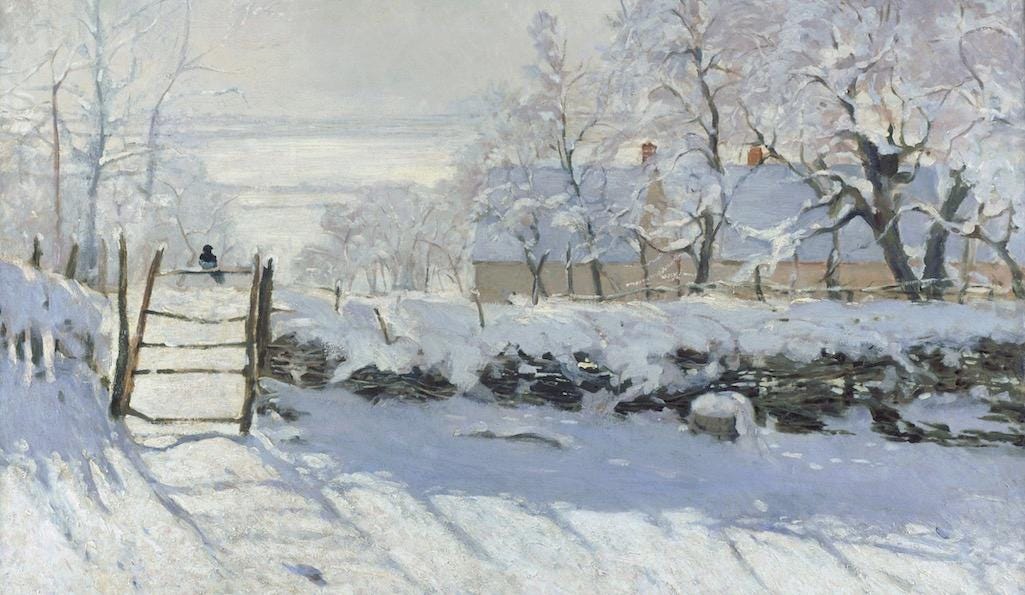
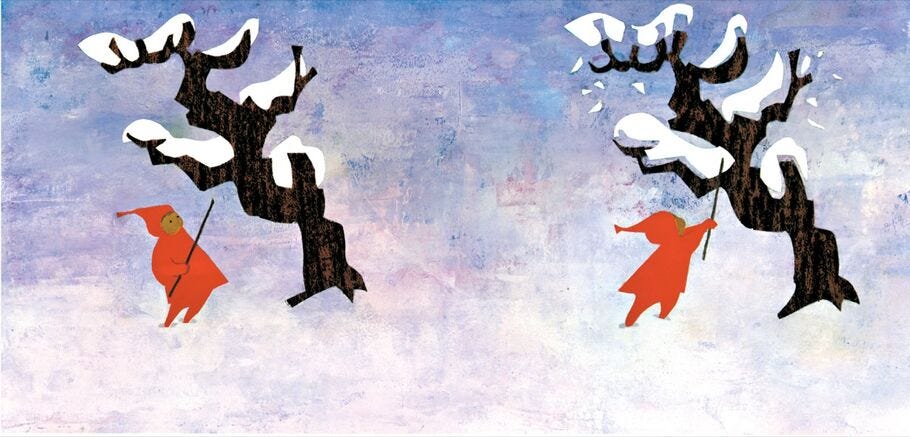

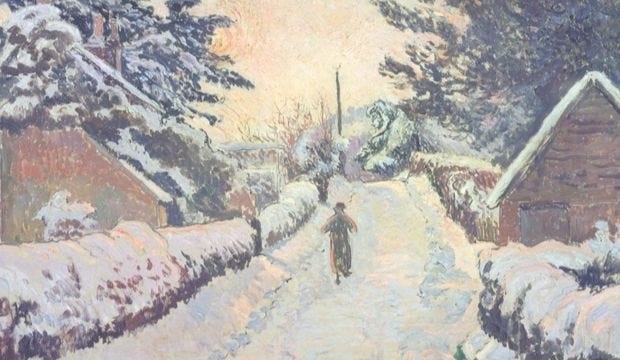
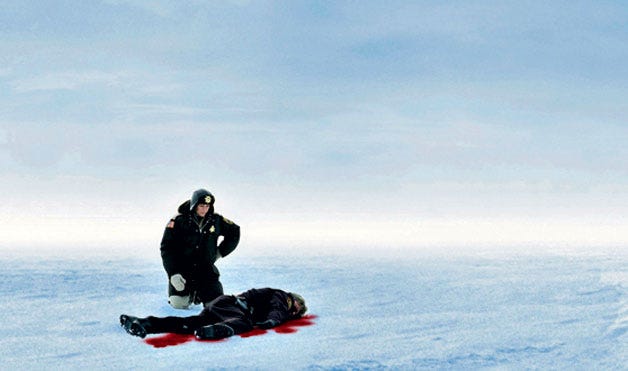
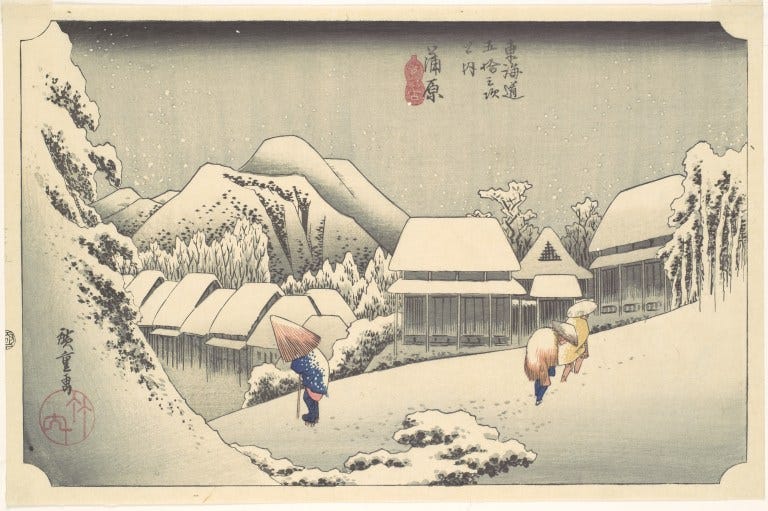
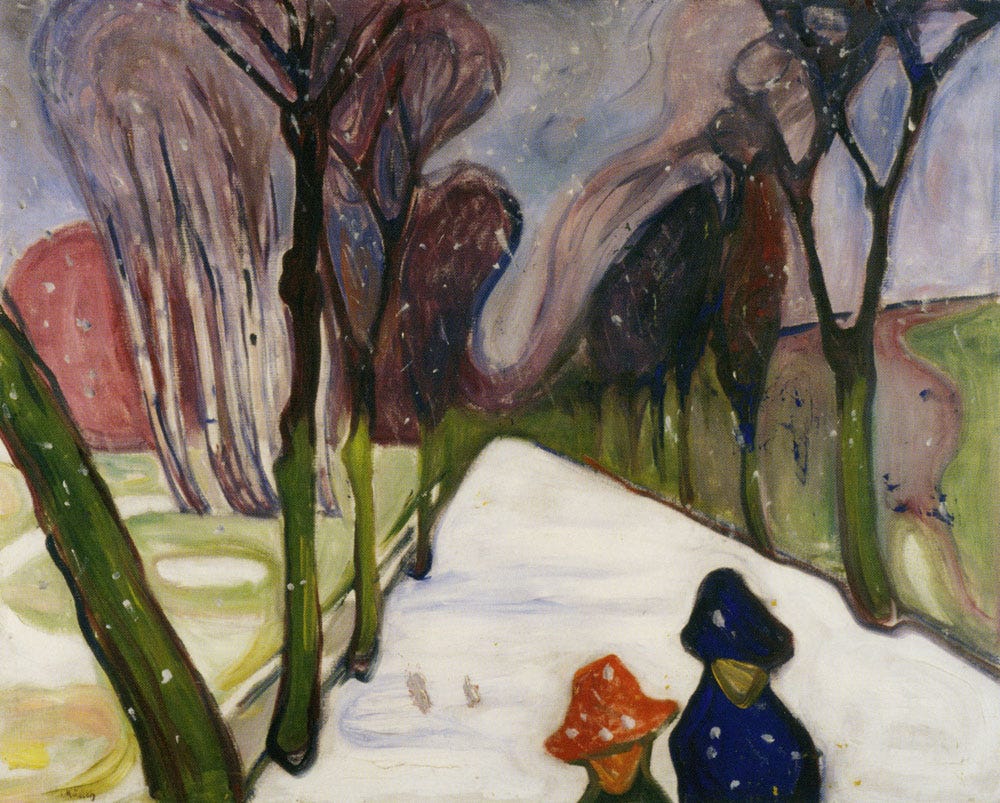
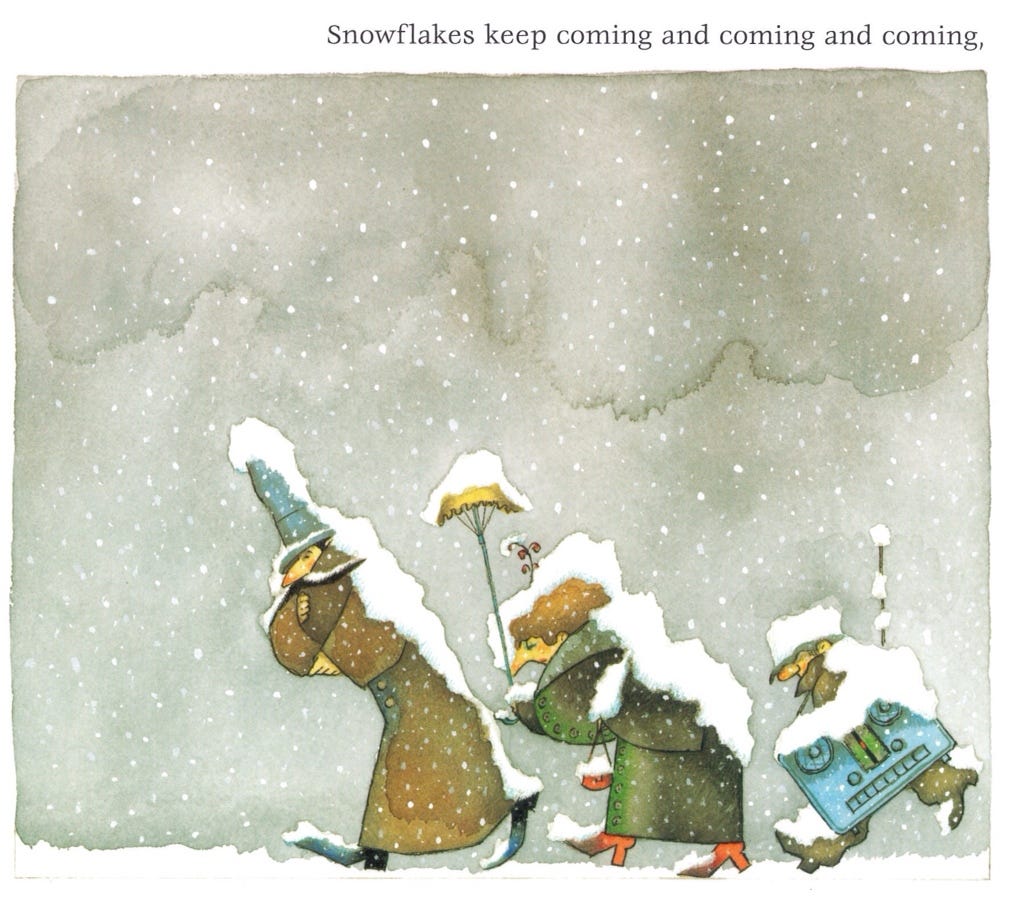

Utter magic! Wishing you a wonderful Christmas and thank you for all the joy and thoughtfulness of these posts! Vxx
Happy Holidays and thank you!! 🙌